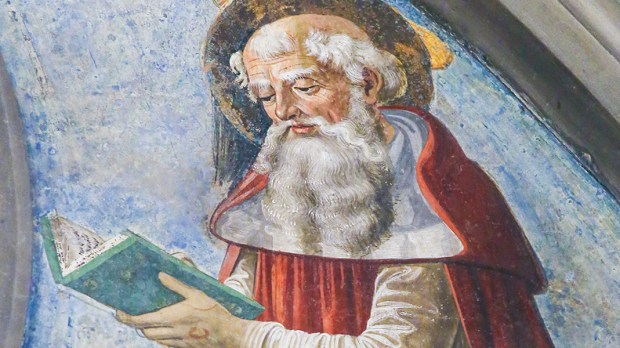On September 30, 2020, from the Basilica of St. John Lateran in Rome, in liturgical memory of the priest and Doctor of the Church St. Jerome, and on the occasion commemorating the 1,600th anniversary of his death in Bethlehem, Pope Francis promulgated the Apostolic Letter SCRIPTURAE SACRAE AFFECTUS(A Devotion to Sacred Scripture). With this letter, the pope not only pays tribute to the life and work of this great human being and Christian, but he also reaffirms the doctrine of the Catholic Church on Sacred Scripture, the primary source for the faith and religion of all believers in Christ, Catholics, and, furthermore, for the experience and human endeavor of every man and woman of goodwill.
The life and work of St. Jerome, the pope says, includes “his tireless activity as a scholar, translator and exegete. Jerome’s profound knowledge of the Scriptures, his zeal for making their teaching known, his skill as an interpreter of texts, his ardent and at times impetuous defence of Christian truth, his asceticism and harsh eremitical discipline, his expertise as a generous and sensitive spiritual guide—all these make him, 16 centuries after his death, a figure of enduring relevance for us, the Christians of the 21st century.” That is why St. Jerome has bequeathed to us as a legacy “a devotion to sacred Scripture, a living and tender love” for the written word of God.

Read more:
How St. Jerome dealt with his excessive anger
To highlight the excellence opportunity and necessity of this pontifical document, I will underscore—at once—seven essential ideas that correspond to the seven sections into which this Apostolic Letter is divided.
First, observing and analyzing the portraits that important painters have made of St. Jerome, the pope finds in them the repetition of two features that define the saint’s profile as a man, primarily, absolutely consecrated to God (monk and penitent) and, secondly, as a scholar, absolutely and rigorously dedicated to the understanding of the Holy Scriptures.

Read more:
A prayer by St. Jerome, to invoke God’s mercy
Second, Francis highlightsJerome’s deep love for Sacred Scripture which, according to the pope’s understanding, is a passionate love similar to that experienced, lived and conveyed by the great prophets of the best Old Testament tradition for the Word of God.
Regarding the study and understanding of Sacred Scripture, and encouraging us all to do the same, the pope says of Jerome that, “In an integrated and skillful way he employed all the methodological resources available in his day – competence in the languages in which the word of God was handed down, careful analysis and examination of manuscripts, detailed archaeological research, as well as knowledge of the history of interpretation – in order to point to a correct understanding of the inspired Scriptures.”

Read more:
3 Lessons from the life of St. Jerome to help you stay calm in an argument
Fourth, in his Letter, the pope highlights the invaluable contribution from the saint of Roman Dalmatia, when, upon beginning the work of translating the biblical texts from the original Hebrew into the Latin of the Europe of his time, he thus gave access to all Christian people to the reading of the Sacred Scriptures through the “vulgar” (commonly used language) from which the name “Vulgate” was derived for Jerome’s translation. This was an undertaking for which, the pope says, St. Jerome “put to good use his knowledge of Greek and Hebrew, as well as his solid training in Latin, employing the philological tools he had at his disposal … The result was a true monument that marked the cultural history of the West.” The pope thus continues: “Medieval Europe learned to read, pray and reason from the pages of the Bible translated by Jerome.”
In this way, “literature, art and even popular language have continually been shaped by Jerome’s translation of the Bible, leaving us great treasures of beauty and devotion.”
Read more:
10 Witty quotes from Saint Jerome
But also, and fifth, the pope underscores the immense value of Jerome’s life and work—especially his translation of the Vulgate—to the evangelizing work of the Church in the world, if we evaluate the positive aspects that all peoples and their cultures have for the life of all humanity and, therefore, for the life of the Church in such a way that God’s Word can reach everyone in their own cultural ways. Because “by his translation, Jerome succeeded in ‘inculturating’the Bible in the Latin language and culture.” His work became a permanent paradigm for the missionary activity of the Church. In effect, “Jerome’s work of translation teaches us that the values and positive forms of every culture represent an enrichment for the whole Church.”
Regarding the life and work of the hermeneutic and exegetical saint, the pope also underscores the strong relationship that Jerome always had with Rome and, therefore, with the Chair of Peter “even when jealousies and misunderstandings forced him to leave the city, he always remained strongly linked to the Chair of Peter.”
And at the end of the Letter, seventh, the pope offers us all, especially young people, an invitation to love, read, know, understand and live what Jerome loved and lived: the new and eternal Word of Life, Word of the Father who is Christ himself. “Dare to fix your gaze on the young Jerome who, like the merchant in Jesus’ parable, sold all that he had to buy the ‘pearl of great price’ (Mt 13:46).” And with the same words that Jerome once repeated, the pope exhorts us: “Read the divine Scriptures constantly; never let the sacred volume fall from your hand.”

Read more:
What we probably don’t know about St. Jerome is just what we need to know
With this Letter, as I said at the beginning, Pope Francis. in line with the great reforms made in the Church and for its mission in the world by the Second Ecumenical Council of the Vatican, invites us—once again—to return to the source, to drink and nourish our faith from the primordial source of the Revelation of God that is Jesus himself—Word of the Father—and his gospels and to place the Holy Scriptures in the centrality of our personal Christian experience and the life and existence of the whole Church.

